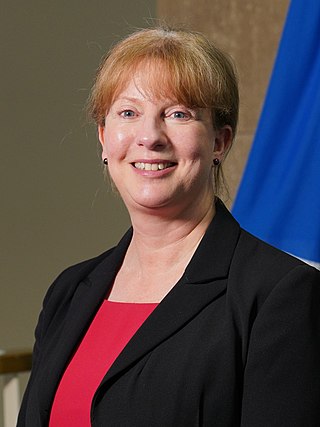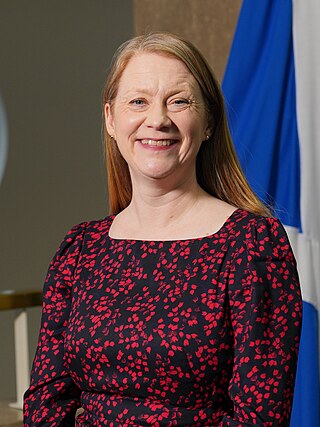
The Scottish Government is the devolved government of Scotland. It was formed in 1999 as the Scottish Executive following the 1997 referendum on Scottish devolution. Amongst its areas for responsibility of decision making and domestic policy in the country include the economy, education system, health care, justice and the legal system, rural affairs, housing, the crown estate, the environment, the fire service, equal opportunities, the transportation network and tax, amongst others.

The first minister of Scotland, formally the First Minister and Keeper of the Scottish Seal, is the head of the Scottish Government and the keeper of the Great Seal of Scotland. The first minister chairs the Scottish Cabinet and is primarily responsible for the formulation, development, and presentation of the Scottish Government's policies. Additional functions of the first minister include promoting and representing Scotland in an official capacity, at home and abroad.

Shona McRory Robison is a Scottish politician who has served as Cabinet Secretary for Finance and Local Government since 2023. A member of the Scottish National Party (SNP), she previously served as Deputy First Minister of Scotland from 2023 to 2024. Robison has been the Member of the Scottish Parliament (MSP) for Dundee City East since 2003 and was an additional member for the North East Scotland region from 1999 to 2003.
The Equality and Human Rights Commission (EHRC) is a non-departmental public body in Great Britain, established by the Equality Act 2006 with effect from 1 October 2007. The Commission has responsibility for the promotion and enforcement of equality and non-discrimination laws in England, Scotland and Wales. It took over the responsibilities of the Commission for Racial Equality, the Equal Opportunities Commission and the Disability Rights Commission. The EHRC also has responsibility for other aspects of equality law: age, sexual orientation and religion or belief. A national human rights institution, it seeks to promote and protect human rights throughout Great Britain.

The Cabinet Secretary for Wellbeing Economy, Net Zero and Energy, commonly referred to as the Wellbeing Economy Secretary, is a Scottish Government Cabinet position with responsibility for the economy of Scotland. The incumbent is Màiri McAllan since 2024.

The Minister for Business is a Junior ministerial post in the Scottish Government. As a result, the Minister does not attend the Scottish Cabinet. The post was retitled in May 2024, with the Minister supporting the Deputy First Minister and Cabinet Secretary for Economy and Gaelic, Kate Forbes.

The Minister for Public Health and Women's Health is a junior ministerial post in the Scottish Government. The minister is not a member of the Scottish Cabinet, however, they report to the Cabinet Secretary for NHS Recovery, Health and Social Care.

The Minister for Higher and Further Education is a Junior ministerial post in the Education Department of the Scottish Government. As a result, the Minister does not attend the Scottish Cabinet. The post was created in May 2007 after the appointment of the Scottish National Party minority administration and the Minister reports to the Cabinet Secretary for Education and Skills, who has overall responsibility for the portfolio, and is a member of cabinet. The Minister has specific responsibility for further education and colleges, higher education and universities, science and STEM (science, technology, engineering and mathematics, student funding, youth work, and widening access to education.

The Minister for Children, Young People and The Promise is a junior ministerial post in the Scottish Government. As a result, the Minister does not attend the Scottish Cabinet. The incumbent reports to the Cabinet Secretary for Education and Skills, who has overall responsibility for the portfolio, and is a member of Cabinet.

The Minister for Victims and Community Safety is a Junior ministerial post in the Scottish Government. As a result, the minister does not attend the Scottish Cabinet. The post was created in May 1999 during the 1st Scottish Parliament as the Deputy Minister for Justice. Deputy ministers were renamed ministers after the election of the Scottish National Party in 2007. The minister reports to the Cabinet Secretary for Justice and Home Affairs, who has overall responsibility for the portfolio, and is a member of cabinet.

The Minister for Housing is a Junior ministerial post in the Scottish Government. As a result, the Minister does not attend the Scottish Cabinet. The incumbent, Paul McLennan reports to Shirley-Anne Somerville, the Cabinet Secretary for Social Justice.

Shirley-Anne Somerville is a Scottish politician who has served as Cabinet Secretary for Social Justice in the devolved Scottish government since 2023. A member of the Scottish National Party (SNP), she has been the Member of the Scottish Parliament (MSP) for Dunfermline since 2016, having previously served as an additional member for the Lothians region from 2007 to 2011.

The Equality Act 2010, often erroneously called the Equalities Act 2010, is an act of Parliament of the United Kingdom passed during the Brown ministry with the primary purpose of consolidating, updating and supplementing the numerous prior Acts and Regulations, that formed the basis of anti-discrimination law in mostly England, Scotland and Wales; some sections also apply to Northern Ireland. These consisted, primarily, of the Equal Pay Act 1970, the Sex Discrimination Act 1975, the Race Relations Act 1976, the Disability Discrimination Act 1995 and three major statutory instruments protecting discrimination in employment on grounds of religion or belief, sexual orientation and age.

Lesbian, gay, bisexual, and transgender (LGBT) rights in Scotland are generally in line with the rest of the United Kingdom, which have evolved extensively over time and are now regarded as some of the most progressive in Europe. In both 2015 and 2016, Scotland was recognised as the "best country in Europe for LGBTI legal equality".

The Minister for Local Government Empowerment and Planning is a junior ministerial post in the Scottish Government. As a result, the Minister does not attend the Scottish Cabinet. The minister supports the Cabinet Secretary for Finance, who has overall responsible for the portfolio.

The Cabinet Secretary for Social Justice, commonly referred to as the Social Justice Secretary, is a position in the Scottish Government Cabinet. The Cabinet Secretary has overall responsibility for community planning, housing, social security, the third sector. The current Cabinet Secretary is Shirley-Anne Somerville since 2023.

Social Security Scotland is an executive agency of the Scottish Government with responsibility for social security provision.
The Cabinet Secretary for Social Security and Older People was a position in the Scottish Government Cabinet. The Cabinet Secretary had overall responsibility for social security, equality and human rights. The Cabinet Secretary was assisted by a junior Minister, the Minister for Older People and Equalities.

The Minister for Public Finance is a Junior ministerial post in the Scottish Government. As a result, the Minister does not attend the Scottish Cabinet.

The Gender Recognition Reform (Scotland) Bill is a bill passed by the Scottish Parliament. The bill seeks to amend the Gender Recognition Act 2004 of the Parliament of the United Kingdom, making it simpler for people to change their legal gender. On 17 January 2023, the United Kingdom government used section 35 of the Scotland Act 1998 to block the bill from receiving royal assent, the first time section 35 has been used.





















